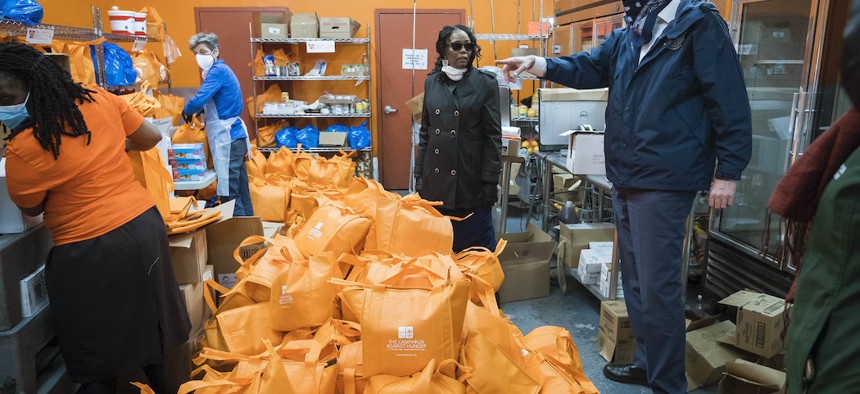Coronavirus
New York City foundations speed up giving for COVID-19 relief
Philanthropy has shifted to offer nonprofits helping vulnerable New Yorkers flexible emergency funding.

Mayor Bill de Blasio visits The Campaign Against Hunger food pantry on April 14th. Ed Reed/Mayoral Photography Office
As New Yorkers face one of the worst COVID-19 outbreaks globally, the philanthropic sector has invested tens of million of dollars into New York City to support relief efforts surrounding hunger, job loss and other needs. And in doling out this emergency funding, many foundations have sped up their grantmaking and relaxed many reporting requirements for their nonprofit partners.
For example, the New York Community Trust is helping administer a collaborative relief fund that has grown to more than $95 million. The effort, called the NYC COVID-19 Response & Impact Fund, is a major collaboration between dozens of foundations, corporations and individual donors such as director Steven Spielberg, having given out more than $44 million in grants and loans to nonprofits in New York City so far.
“There’s a lot of partnership that’s going on because the issues are so big,” said Emary Aronson, who is heading relief efforts for the Robin Hood Foundation, which has contributed to the fund and spearheaded its own COVID-19 funding initiative. The foundation has accelerated $20 million in payments to existing grantees and issued about 220 new emergency grants in the past several weeks.
More than 20 foundations from across the state, many of which focus on funding New York-based groups, have signed onto a pledge with the Council on Foundations to loosen or eliminate restrictions on current and new grants to nonprofits so they can use funding more flexibly as they need to adjust their services in response to the pandemic. Nonprofits have historically criticized some funders for reporting requirements that create burdensome paperwork that hampers their work. And while other initiatives have emerged in the past several years to lend more flexibility and power to grantees, COVID-19 has put more pressure on foundations to avoid burdening nonprofits already financially strained by cancelled fundraisers and grappling with a pivot to remote work.
Marcella Tillett, vice president of programs and partnerships at the Brooklyn Community Foundation, said that not all funders are providing similar levels of flexibility and giving during the crisis, however. The Brooklyn Community Foundation – and other funders like the New York-based North Star Fund – has committed to spending more even if their endowment takes a financial hit, while others are playing it more cautiously as the market takes a hit.
“I get the sense that the proximity, whether physical or emotional, to the issue is a critical driver of how much you’re willing to push your institution to respond,” Tillett said, highlighting the value of philanthropy focused on a specific community.
Many of the coronavirus relief funds that have been created in New York have been spearheaded by community foundations, from Long Island to the North Country, though many have partnered with corporations and other private foundations to raise and deploy money.
Figuring out how philanthropic initiatives will continue as the coronavirus pandemic persists for an indefinite amount of time is difficult.
“In general, New Yorkers are always generous people, in good times and bad, and that generous New Yorkers have been giving generously to pandemic relief efforts,” said Kerry McCarthy, the New York Community Trust ’s vice president for philanthropic initiatives. “Our experience suggests though that the longer this goes on, the harder it will be for our nonprofits to raise funding and donor fatigue will become inevitable.”
Foundations are also keeping an eye on how to respond to growing needs. Drawing from experience providing philanthropic relief in the aftermath of the 9/11 attacks, Aronson said it was likely that in future stages of COVID-19 relief funding, Robin Hood would likely begin to fund more mental health initiatives.
“We’re all still figuring out what happens because we’re all still in the situation, and so things change on a regular basis,” she said.
Correction: An earlier version of this post incorrectly characterized how much the NYC COVID-19 Response & Impact Fund has awarded in grants relative to past years.
NEXT STORY: Leader to Leader: John Raskin